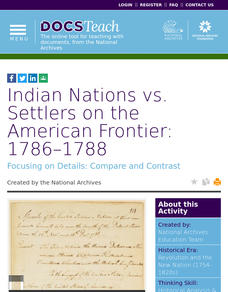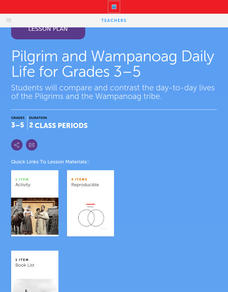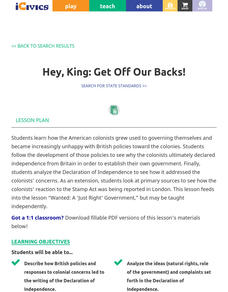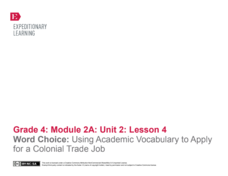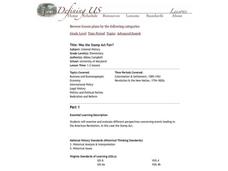DocsTeach
The Voting Record of the Constitution
A piece of the past helps shape the future. Learn what historical documents reveal about the past using an engaging activity. Academics participate in a role-playing scenario, view the voting record of the Constitutional Convention,...
DocsTeach
Road to Revolution: Patriotism or Treason?
Patriot or traitor? Scholars debate the line between patriotism and treason in a short activity. Academics analyze a political cartoon and discuss varying viewpoints between different groups living in the American colonies. The activity...
DocsTeach
Prequel to Independence
It's about time! Young historians use primary sources to create a timeline of events leading to American Independence. The fast-paced activity is designed to be used at the end of a unit on the Revolutionary War or as an assessment tool....
DocsTeach
Political Cartoon Analysis: No Taxation Without Representation
Delve into the world of political cartoons in a lesson on the American Revolution. Scholars practice analyzing an original political cartoon, answer questions, and participate in group discussion. Young academics gain an understanding of...
DocsTeach
Indian Nations vs. Settlers on the American Frontier: 1786–1788
Once Americans won the Revolutionary War, their quest to gain land did not end. An interesting activity focuses on Americans' expansion into the frontier following the war and how it conflicted with Native Americans living in the area....
DocsTeach
Boston Tea Party Image Analysis
Elementary scholars become Sherlock Holmes to analyze a lithograph showcasing the Boston Tea Party. Scholars view the image with some pieces missing and must write an observation. Individuals are then shown the whole image and asked to...
Scholastic
Pilgrim and Wampanoag Daily Life for Grades 3-5
Thirteen steps make up a lesson that challenges pupils to compare and contrast the daily lives of Pilgrims and the Wampanoag tribe. Learners revisit the Graffiti Wall then break into small groups for an investigative reading assignment...
National Woman's History Museum
Pocahontas: The Truth vs. The Legend
Young historians study primary and secondary source materials to try and separate the true story of Pocahontas from the myths, fictional tales, and conflicting accounts of her life.
iCivics
Hey, King: Get Off Our Backs!
Young historians explore the reason American colonists were unhappy under British rule. Class members complete hands-on activities and participate in a group discussions to understand why colonists drafted the Declaration of Independence.
EngageNY
Word Choice: Using Academic Vocabulary to Apply for a Colonial Trade Job
Scholars reflect upon colonial jobs such as a blacksmith, cooper, shoemaker, etc. Together, the class writes a job application as a practice for working independently. Learners employ their experience in writing a job application for a...
Stanford University
Declaration of Independence
Scholars work in pairs to decide whether leaders wrote the Declaration of Independence for the rich and powerful or for every man. To draw their conclusion, pairs read excerpts from two historians and complete a graphic organizer citing...
Benjamin Franklin Tercentenary
Join, or Die: Reenacting the Albany Conference
The Albany Congress was one of the first attempts at colonial unity. While it was an effort against the French during the French and Indian War, it was one of the events leading up to the American Revolution. Scholars consider the...
Benjamin Franklin Tercentenary
Franklin’s Philadelphia: Another Point of View
While Benjamin Franklin enjoyed fame and success in colonial Philadelphia, that was not the experience of all coming to the British colonies. Young scholars trace the life of an indentured servant using a scholarly biography and reading...
Benjamin Franklin Tercentenary
Franklin’s Philadelphia: Another Point of View
The impressive story of Benjamin Franklin, including his rise from a printer’s apprentice to a statesman, color upper-level scholars’ understanding of the possibilities of life in colonial Philadelphia. But not everyone had the...
Annenberg Foundation
Colonial Designs
The adventures of the New World came at a cost for Native Americans. Scholars investigate the economic side of settling the European colonies. Using video clips, statistical evidence, and primary sources, they create hypotheses and...
New York City Department of Education
Colonial America and The American Revolution
How did the founding of the American colonies lead to a revolution? Use the essential question and sample activities to guide learners through a series of history lessons. Additionally, the packet includes effective strategies to...
K12 Reader
An Independent Nation
If your kids are curious about the American Revolution, help them understand more about its background with a reading passage and comprehension questions. Kids use context clues to answer each question, some of which require more...
North Carolina Consortium for Middle East Studies
The French and Indian War: The War That Shaped America’s Destiny
How would a Frenchman, Englishman, and Native American have each viewed the French and Indian War? Your young historians will learn about their unique perspectives and the war as a whole through a role-playing activity, engaging...
EngageNY
Taking Notes Using a Graphic Organizer: Inferring About the Importance of Religion in Colonial America
Improve class understanding of colonial times by reading an informational text and filling out the accompanying graphic organizer. Class members work with a partner to read, take notes, make inferences, and synthesize information.The...
EngageNY
Taking Notes Using a Graphic Organizer: Inferring About Work and Play in Colonial America
What was life like in colonial America? Follow this lesson and your pupils will find out what people in colonial times did for work and for fun. Ask learners to compare and contrast the two texts and explain what the reading helped them...
EngageNY
End of Unit 1 Assessment: Inferring and Synthesizing (From Two Texts) About Life in Colonial America
Close your colonial America unit with a performance-based assessment. Class members will show their proficiency in several skills including using details to back up inferences, determining the meaning of words in context,...
EngageNY
Research: Identifying Categories for Our Research About the Wheelwright
Here is a fine lesson on reading and understanding expository text designed for 4th graders. With a partner, learners read a passage of text about a machine called a wheelright. This machine was commonly used in the colonial period....
Curated OER
Was the Stamp Act Fair?
Elementary and middle schoolers examine and evaluate different perspectives concerning events leading to the American Revolution. In this case, they hone in on the Stamp Act. They research controversial bills, laws, or events of the time...
Curated OER
An Empire in the Balance
Eleventh graders investigate the role of New York state during the American Revolution. In small groups, they research a particular region within colonial America, analyze primary source documents, complete Document Analysis Sheets, and...






